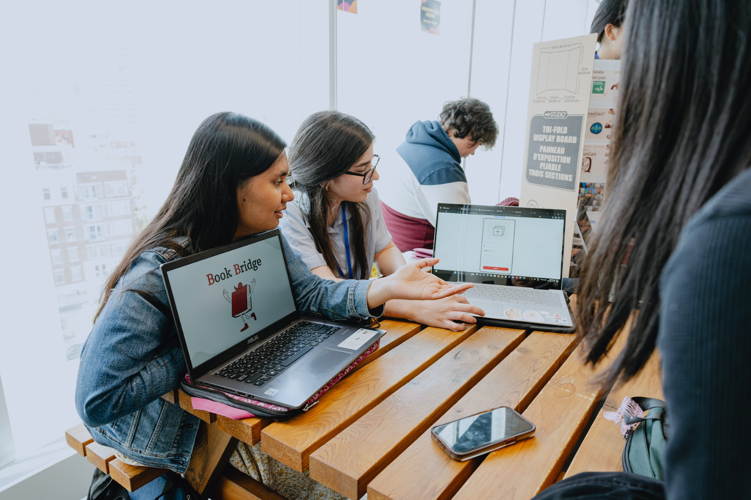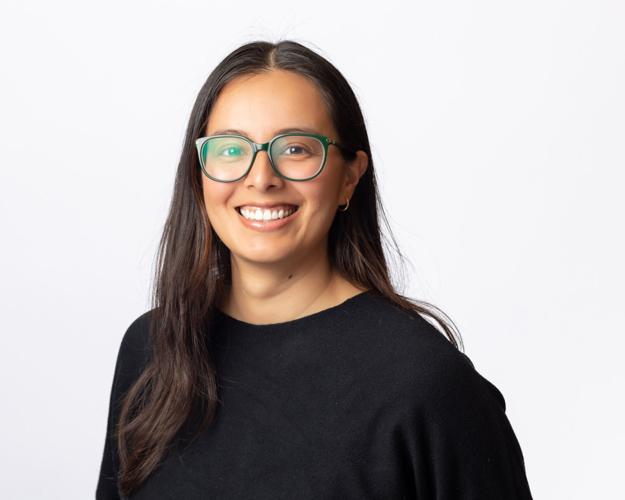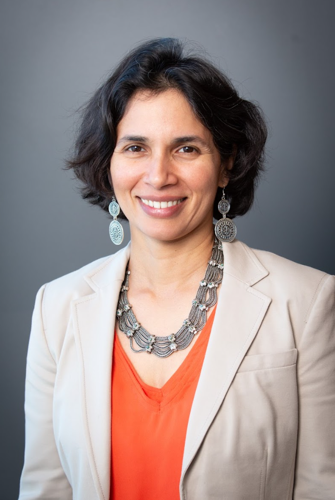
Despite STEM being male-dominated, women in these occupations increased by 31% between 2011 and 2021. (Photo courtesy of Technovation.)
After the Trump Administration instructed federal agencies to halt all financial assistance, Dr. Tara Chklovski, the founder and CEO of Technovation, a global nonprofit organization, said that they will remain committed to connecting underrepresented communities to STEM and AI education, regardless of external challenges.
Through free, research-based programs, Technovation is providing girls with the right tools to solve real-world problems and become innovators. “In 2024, we reached over 31,000 girls globally, focusing on underserved communities. By leveraging mentorship, local partnerships and accessible resources, we ensure equitable access to STEM education, empowering the next generation of leaders and problem-solvers,” Dr. Chklovski said.

Dr. Tara Chklovski, the founder and CEO of Technovation. (Photo courtesy of Dr. Tara Chklovski.)
Ending DEI initiates not only would harm individuals in the workplace but would also affect schools and higher education institutions. According to the ACLU, schools are at a minimum required to comply with federal and state civil rights laws that ensure educational opportunities are provided on an equal basis. This means evaluating policies and practices to make sure they do not unnecessarily restrict opportunities based on race or other protected characteristics.
Dr. Chklovski said that her journey in STEM began as an aerospace engineer, but her passion for education and addressing inequities in STEM led her to launch Technovation. She told CALÓ News that Technovation is designed to reach girls from all backgrounds, particularly those in underserved communities. “Many Latina girls face barriers to STEM education and often lack role models who look like them. Through our program, girls not only learn coding, AI ethics and entrepreneurship but are also paired with mentors, including women who are leaders in tech. These mentors serve as role models, showing girls what’s possible and helping them envision a future in STEM,” she said.
According to the Pew Research Center, Latina women make up just 3% of the STEM workforce. For Dr. Chklovski, advocating for STEM education and empowering future generations of girls in tech is more important now than ever.
“STEM is the foundation for solving many of the world’s most pressing challenges, but without diverse voices, innovation risks leaving entire communities behind. Women, in particular, are the single largest group in danger of being left behind in the AI revolution. Research shows that women account for only 15% of inventors, receive less than 20% of venture capital funding, and earn just 82 cents for every dollar earned by men. Additionally, a recent analysis of nearly 100 research articles found that women are significantly less likely to learn about, use or build AI technologies,” Dr. Chklovski said. She also stated that the organization is committed to addressing these inequities by empowering girls to see themselves as leaders, innovators and problem solvers.
She also shared that that is the reason why they decided to launch The AI Forward Alliance (TAIFA), which is a global partnership to equip girls with the right tools and skills to tackle complex global challenges through AI. Through TAIFA, they aim to impact 25 million girls globally, providing mentorship, education and support to help them thrive in STEM.
“Empowering girls in tech isn’t just about addressing a gender gap—it’s about ensuring the full potential of innovation is unlocked to create a better, more equitable future for everyone,” Dr. Chklovski said.
Vanessa Tostado, a Technovation alumna, shared that growing up in an immigrant household, education was a core value instilled in her from a young age. Her parents always emphasized the importance of school as a pathway for the opportunities that they didn’t have.
As a first-generation Latina, Tostado said that going to college was a monumental achievement, not just for her but for her entire family. “I’m incredibly proud to set an example for my siblings. Landing my first full-time job as a software engineer five years ago was equally significant. It was the culmination of years of effort, but it also gave me a platform to create change, not just in my own life but for my family and community. It allowed me to support my family in ways I had always dreamed of,” Tostado said.

(Photo courtesy of Vanessa Tostado.)
She shared that she has always gravitated towards STEM subjects as they were challenging but also rewarding to her. “I loved the feeling of solving a complex problem or learning how something worked, and STEM felt like the perfect space to apply those skills. I also saw STEM as a way to make a tangible impact on the world—whether it was through creating solutions, improving systems or solving big challenges,” she said.
For Tostado, it’s also crucial to advocate for other Latinas to join STEM, especially since it's a male-dominated field. “Encouraging Latinas to join STEM is vital because representation matters. When young girls see women, especially Latinas, excelling in STEM, it challenges the stereotypes that say these fields aren’t for them,” Tostado said. Despite STEM being male-dominated, women in these occupations increased by 31% between 2011 and 2021.
For the past 11 years, Technovation has made a significant impact across Latin America, including Mexico, empowering girls with the tools to succeed in STEM. Programs in the region have connected girls with mentors and provided opportunities to create real-world solutions to challenges in their communities.
Dr. Chklovski said that mentoring is essential and transformative, especially for first-generation students who often lack access to professional networks or role models. At Technovation, their approach is rooted in Bandura’s self-efficacy theory, which highlights the importance of role models, meaningful experiences and high expectations.
“Mentors reduce the fear of failure by sharing success strategies, fostering confidence and encouraging students to take on challenges that align with their personal and community values. In STEM, where underrepresentation can amplify feelings of exclusion, mentors play a critical role in building self-belief and resilience,” Dr. Chklovski said.
Tostado also agrees that mentorship is crucial for underrepresented communities. “Mentorship can be a game-changer, especially for first-generation students like me, who often lack the networks and guidance that others might take for granted,” she said. “Before joining Technovation, I was struggling with a computer science class in high school and was on the verge of dropping out of the course. My mentors from Technovation stepped in and helped me reframe the challenges I was facing. They encouraged me to ask for help, taught me how to approach problems with confidence and reminded me that setbacks are part of the learning process.”
She also said that the support from the organization not only kept her in the class but also gave her the confidence to keep pursuing STEM. “Mentorship provides more than technical guidance; it gives students the belief that they belong in spaces where they might not see people who look like them. It’s a bridge that can help first-generation students navigate unfamiliar territory and reach their potential,” she said.

Technovation is the global tech education nonprofit that inspires girls to be leaders and problem solvers in their lives and their community. (Photo courtesy of Technovation.)
In California, the Hispanic Foundation of Silicon Valley launched a Technovation chapter during in 2024 to expand opportunities for underserved girls. This chapter collaborates closely with local university students—specifically Latinas pursuing STEM fields—who serve as mentors, providing representation and inspiration for the girls.
“My advice to other Latinas is to recognize the power of community and mentorship. Growing up, many of us are taught to stay humble, not draw too much attention, or avoid speaking out of turn. But in STEM, your ideas and your voice are your greatest assets. Don’t be afraid to break out of that mold,” Tostado said. “Surround yourself with people who believe in you—mentors, peers, friends—who will push you to step outside your comfort zone and encourage you to advocate for yourself.”
Dr. Chklovski also said that the goal isn’t just to learn technical skills but to use them to address challenges that matter. “Keep pushing forward; the world needs your ideas and solutions,” she said.
















(0) comments
Welcome to the discussion.
Log In
Keep it Clean. Please avoid obscene, vulgar, lewd, racist or sexually-oriented language.
PLEASE TURN OFF YOUR CAPS LOCK.
Don't Threaten. Threats of harming another person will not be tolerated.
Be Truthful. Don't knowingly lie about anyone or anything.
Be Nice. No racism, sexism or any sort of -ism that is degrading to another person.
Be Proactive. Use the 'Report' link on each comment to let us know of abusive posts.
Share with Us. We'd love to hear eyewitness accounts, the history behind an article.